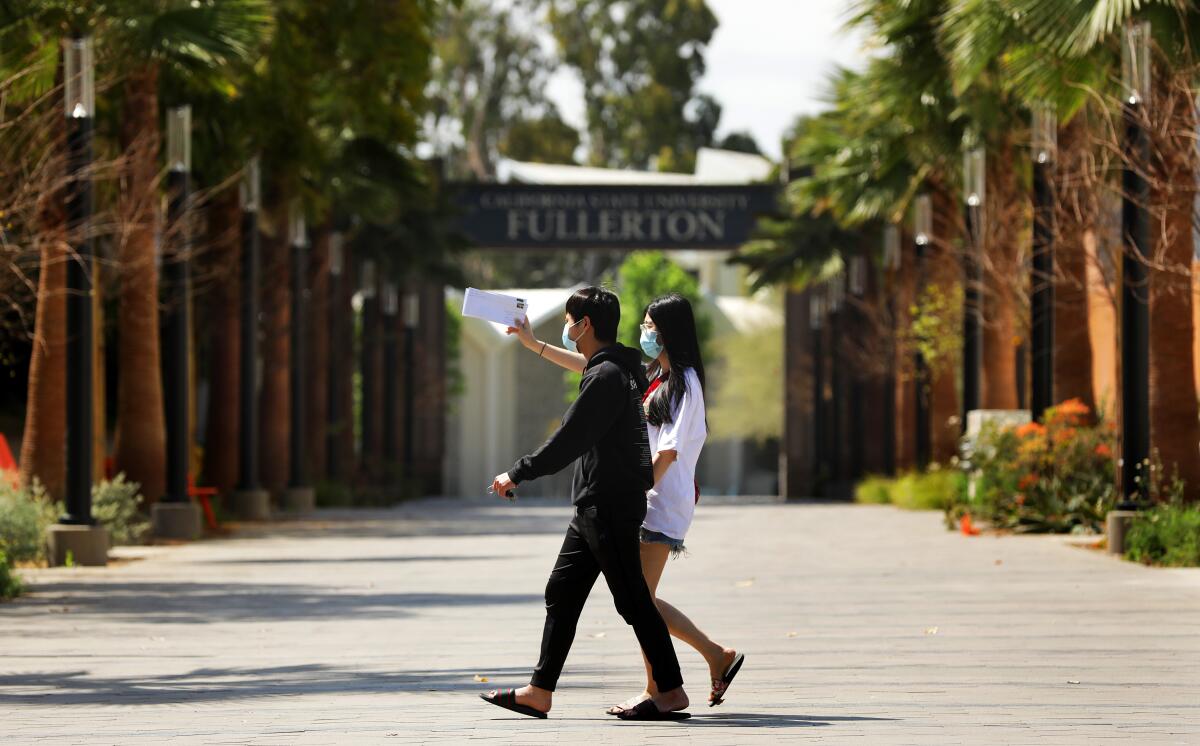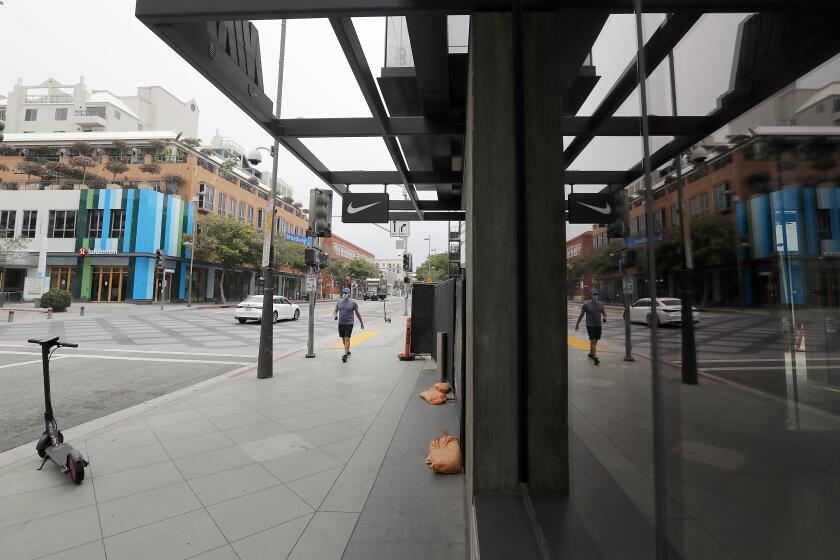CSU plans to cancel most in-person classes and go online this fall, chancellor says

California State University, the nation’s largest four-year college system, plans to cancel most in-person classes in the fall and instead offer instruction primarily online, Chancellor Timothy White announced Tuesday.
The vast majority of classes across the 23-campus Cal State system will be taught online, White said, with some limited exceptions that allow for in-person activity.
“Our university, when open without restrictions and fully in person … is a place where over 500,000 people come together in close and vibrant proximity,” White said at a meeting of Cal State’s Board of Trustees. “That approach sadly just isn’t in the cards now.”
The decision to continue remotely reflects how schools throughout the country are grappling with reopening challenges inflicted by the coronavirus crisis — and what campuses will look like when they do decide to reopen.
University of California officials are examining the parameters of what it would take to open their campuses and are expected to announce plans in June or July. UC spokeswoman Claire Doan reiterated Tuesday that campuses were exploring a “mixed approach with some instruction delivered in classroom and lab settings, while other classes will be primarily online.”
President Janet Napolitano said campuses will first be required to satisfy systemwide guidelines to ensure public health and safety, and any reopening “will probably be greatly reduced.”
Janice Brown was the first patient at Desert Valley Hospital’s COVID-19 unit. And the first to be released. Neither she nor her doctors or nurses expected her to return. Within weeks, she tested positive again.
White said his decision resulted from a confluence of issues around COVID-19, including the health and safety of students, faculty and staff, as well as significant financial constraints.
The Cal State system is projecting losses of $337 million for the spring term alone as a result of the pandemic, including loss of revenue from student housing, parking and campus bookstores, as well as unanticipated costs related to cleaning, overtime and the shift to distance education. The figure does not reflect offsets from federal aid or operational savings.
White’s announcement came the same day that infectious disease expert Dr. Anthony Fauci, a key member of the White House coronavirus task force, told a Senate panel it would be “a bridge too far” to think treatments or vaccines could be available in time to facilitate students’ reentry into schools this fall.
It also follows an earlier move by Cal State Fullerton, which in late April became one of the first universities in the nation to announce it was planning for remote instruction this fall.
White said that for the small number of classes where in-person instruction is “indispensable and can be justified” — such as clinical nursing courses, biology labs or merchant marine training — sufficient resources and protocols will have to be in place to ensure the health and safety of students and teachers.
“The enrollment per section will be less; for instruction and research laboratories, the distance between participants greater; the need for personal protective equipment appropriate to the circumstance prevalent; and the need to sanitize and disinfect spaces and equipment between users essential,” White said.
On some campuses and within some departments, course offerings will be exclusively virtual. At others that rely heavily on hands-on experience, there may be more exceptions.
White said planning for an online fall term was necessary because of the forecast of additional waves of COVID-19 outbreaks later this year, possibly coupled with a difficult flu season. He said it would be “irresponsible” to wait until August to make a decision, only to “scramble and not be prepared to provide a robust learning and support environment.”
He also acknowledged that the university system lacks the resources to provide coronavirus testing for everybody and to trace the contacts of infected people should there be an outbreak on a campus.
CSU students and families, along with faculty and staff, can expect to receive more information this month from their respective campuses about instruction in the fall.
Availability of on-campus housing will be reduced, and student athletes shouldn’t expect to resume regular sports before faculty and students return to campuses, White said.
White reached the decision about the fall term with all 23 campus presidents and also had discussions with representatives of faculty and student groups, a spokesman for the chancellor’s office said.
Los Angeles County has 88 cities. A reformer says that in the face of the pandemic’s economic impact, cities will have to transform or wither.
The statewide academic senate has not adopted any resolution about instruction in the fall and was not formally asked for feedback on the decision to go primarily online, Chair Catherine Nelson said. But, she said, “I am not surprised by the decision, given the incredible complexity of mounting any level of in-person courses in the fall.”
Nelson said the senate has asked campuses to conduct surveys of their faculties’ needs and will request resources to meet them, such as professional development, hardware and software.
While many campuses have extended the deadline for students to submit their “intent to register,” CSU officials told trustees Tuesday that early numbers show generally normal enrollment levels.
White urged incoming and current students to stay the course and persist in their pursuit of higher education.
“This is not the time to pause or decline an opportunity to attend a CSU campus,” he said. “Robust financial aid remains available.”
Trustees did not make any decisions about tuition or fees for the fall term. But several of them, led by ex officio trustee Lt. Gov. Eleni Kounalakis, urged the board to avoid considering a tuition hike to plug budget holes.
“There’s going to be a lot of students questioning the value of going into debt for higher education if you’re not physically in the classroom,” Kounalakis said.
Times staff writer Teresa Watanabe contributed to this report.
More to Read
Start your day right
Sign up for Essential California for news, features and recommendations from the L.A. Times and beyond in your inbox six days a week.
You may occasionally receive promotional content from the Los Angeles Times.









